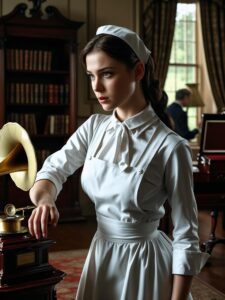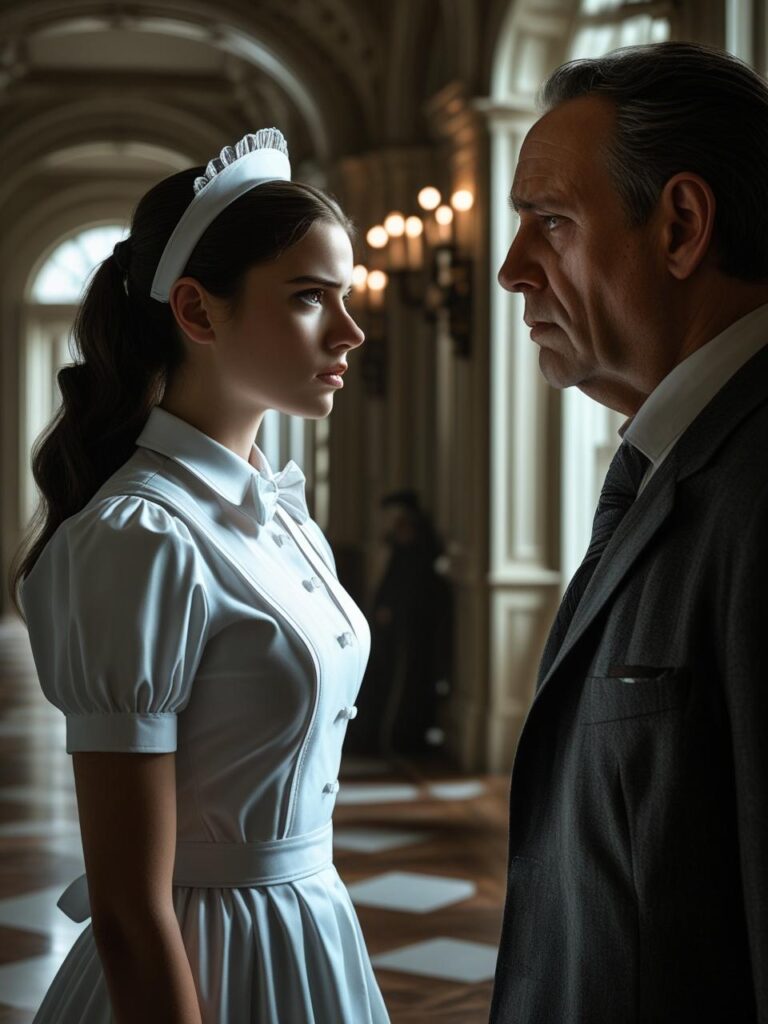Nobody really noticed Maria.
She moved through the Preston household like a shadow—quiet, invisible, slipping from room to room with the grace of someone who had long accepted invisibility as a form of protection. Hired through a domestic agency two years prior, Maria had become part of the furniture: useful, unassuming, utterly forgettable. She came in at seven, left by six, and never once interrupted. Never gossiped. Never complained. To the Prestons, she was just “the help.”
But Maria watched. And Maria listened.

The Preston house was a palace of glass, all high ceilings and marble floors, but the real weight of it was carried in the silence between its walls. Eleanor Preston, the wife, had the elegance of someone born into wealth but wore a quiet bitterness like perfume. Jonathan Preston, her husband, was a man of reputation—wealthy, polished, dangerous. There was something about his charm that unsettled Maria. Something about how he smiled just a second too late, or how his eyes never quite matched the warmth in his voice.
Eleanor and Jonathan fought more than they spoke. Words like daggers flung across mahogany dinner tables. Accusations muttered under breath. Doors slammed harder than necessary. Eleanor often stared into her glass of wine longer than she stared at her husband.
Maria never intervened. She just collected broken wine glasses, wiped clean the tear-stained counters, and made mental notes of everything unsaid.
It was the scent that changed everything.
One Thursday evening, Eleanor stood by the door, scarf in hand, when Jonathan breezed past her in his tailored coat. She reached to slip the scarf into his collar and froze. The smell hit her like a slap—sweet, cloying, unmistakably not her. Eleanor wore Chanel No. 5, something delicate and old-world. This was different. Synthetic. Cheap. Like a perfume sample from a teenager’s magazine.
She didn’t say a word, but something inside her shifted.
Later that night, Eleanor stood by the kitchen doorway, watching Maria silently polish the silverware. “Do you ever get the feeling,” she asked, almost absentmindedly, “that someone’s lying to you every time they open their mouth?”
Maria looked up briefly, her face unreadable. “All the time,” she replied.
Eleanor smiled faintly. “You’re smarter than you look.”
Maria gave no answer.
That weekend, Jonathan left for a “conference” in Singapore. Maria noticed the plane ticket stub, crumpled and shoved into the trash: economy class to Bangkok. She also noticed the lipstick stain—coral pink—on the collar of one of his freshly laundered shirts. She didn’t need to say anything. The house spoke for itself.
Then came the rainy night.
It was past midnight when the front door burst open. Maria, startled from sleep in her small attic room, crept down the stairs barefoot. Eleanor stood in the hallway, drenched, mascara bleeding, holding something wrapped in a coat. Her hands were trembling.
“I need your help,” she whispered.
Maria didn’t hesitate.
Together, in the kitchen, under the harsh light of the chandelier, Eleanor unwrapped the coat. A pistol. Old, heavy, unregistered. “It’s not loaded,” she muttered, “yet.”
Maria said nothing.
“I followed him,” Eleanor confessed, voice brittle. “To that little apartment near the docks. I saw her. He didn’t even bother to hide it. She looked so young, Maria. She could’ve been our daughter.”
Maria placed a kettle on the stove, as if this were any other night.
“What do I do?” Eleanor’s voice cracked. “I gave him twenty years. And now I’m just some expensive painting on his wall. He’s not going to leave her, I know it.”
Maria poured the tea, slid it across the table.
“You don’t want blood,” she said. “You want power.”
Eleanor blinked. “Excuse me?”
Maria leaned in. “Men like him don’t suffer from bullets. They suffer from exposure.”
And then she told Eleanor something that made her blood run cold.
“I know what he does on his business trips. I know the girl in Bangkok isn’t the first. I know about the fake names, the offshore accounts. I know where the papers are.”
Eleanor stared at her. “How do you know all this?”
Maria smiled softly, almost sadly. “Because I was never just your housekeeper.”
She stood slowly, reached into her handbag, and pulled out a badge—black leather, gold crest.
“Interpol. Undercover division. We’ve been investigating your husband for eighteen months.”
The silence was deafening.
Maria explained, calmly, that Jonathan Preston was under suspicion for international trafficking, money laundering, and corporate fraud. His spotless reputation had made it nearly impossible to get close—until the agency placed Maria inside.
“I was supposed to stay hidden,” she said. “Gather evidence, build the case. But he’s growing careless. And now you’re involved. That changes things.”
Eleanor gripped the table, her world tilting beneath her. “So what do we do?”
“We expose him,” Maria said. “With your help.”
The next week was a quiet storm. Eleanor played the perfect wife while secretly granting Maria access to safes, files, passwords. They downloaded emails, copied ledgers, photographed forged documents. Every night, Eleanor shook with adrenaline. Every day, Maria grew more and more impressed by the steel hidden beneath Eleanor’s soft silks.
The takedown was scheduled for a Friday evening.
Jonathan returned from yet another “business trip” to find the house suspiciously quiet. No wine waiting. No dinner laid out. Just Maria, waiting by the door.
“They know,” she said simply.
“What are you talking about?” he scoffed.
“Interpol,” she replied. “And your wife.”
And that’s when Eleanor stepped out from the shadows of the study.
Jonathan didn’t go quietly.
He screamed. Threatened. Accused. But within ten minutes, he was in handcuffs, dragged out under the flashing red and blue of sirens. The neighbors peeked through curtains. Eleanor stood at the doorway, spine straight, watching it all with eerie calm.
Maria turned to her. “You’ll be fine now.”

Eleanor reached out, touched Maria’s wrist. “You saved me.”
“No,” Maria replied. “You saved yourself. I just gave you the map.”
As Maria walked out into the rain, Eleanor whispered, “What happens to him now?”
Maria looked back once. “He’s going to prison for a long, long time. And something tells me… you’re going to start living for the first time in twenty years.”
That night, Eleanor opened a bottle of wine and poured just one glass.
And in the quiet of her new freedom, she finally smiled—not because the house was empty, but because she finally understood how to fill it.


